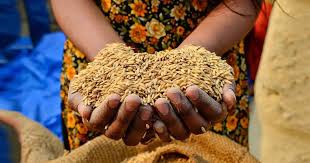
 Ch. Yasir Gondal
Ch. Yasir Gondal
Food insecurity in Pakistan is a complicated issue, which is deeply intertwined with economic, social, and political factors in Pakistan. One of the critical obstacles tackling this problem is the political hurdles that hinder effective policy implementation, resource allocation, and coordinated efforts to ensure food security. Pakistan is democratic country so political interference within departments is the root cause of every issue in Pakistan. Food insecurity is a pressing issue in Pakistan, magnified by various political hurdles, Key political hurdles include governance inefficiencies, policy inconsistencies, corruption, and lack of leadership, political instability and regional disparities. Addressing these challenges requires coordinated efforts to enhance governance, implement consistent policies, reduce corruption, and ensure equitable resource distribution. Pakistan is an agricultural country, faces many food insecurity despite its agricultural potential. The Global Hunger Index ranks Pakistan poorly, highlighting the severity of the issue, lack of political will and governance challenges are major contributors to this problem, affecting food production, distribution, and accessibility. Frequent changes in government, political unrest, and instability disrupt long-term planning and the consistent implementation of food security programs. This instability creates an unpredictable environment for both, national and international stakeholders involved in agricultural and food security initiatives especially in Pakistan. Governments often prioritize short-term political gains over long-term food security strategies. Political considerations often influence resource allocation, leading to inadequate funding for critical areas such as agricultural infrastructure, research, and rural development. Budget constraints further exacerbate the situation, limiting the scope and reach of food security programs. Excessive bureaucracy hinders timely decision-making and lack of effective policy and implementation of food security programs. Weak institutions fail to enforce policies effectively, leading to inefficiencies in food production and distribution. Lack of Long-term Planning Frequent changes in government lead to inconsistent policies. Subsidy is another abundant issue, poorly mismanaged subsidies benefit larger landowners rather than small farmers, exacerbating inequalities. Misallocation of Resources Corruption leads to the misallocation of resources meant for food security programs, reducing their effectiveness. Market Manipulation Corrupt practices in the market, hoarding and price manipulation, create artificial food shortages and price hikes. Provinces receive unequal attention, funds and resources, leading to disparities in food security across all regions in Pakistan. Discrimination is another issue leading to food insecurity in different areas Pakistan Like Balochistan and rural Sindh are often neglected, exacerbating food insecurity in these regions.
Establish independent new bodies to monitor and ensure transparency in the allocation and utilization of resources dedicated to food security in Pakistan. Implement strict anti-corruption measures and strictly enforce legal actions against those involved in corrupt practices . Built political consensus on key food security policies to ensure continuity and consistency, regardless of changes in government. Encourage multi-party agreements on critical issues related to food security to create a stable policy environment. Simplify bureaucratic procedures to facilitate quicker and efficient decision-making and implementation of food security programs. Enhance inter-departmental coordination through integrated, planning and communication mechanisms. Develop and implement a comprehensive national food security strategy with a focus on long-term goals and sustainability. Prioritize food security in national development agendas and ensure consistent political commitment across different administrations. Increase budgetary allocations for agricultural development, rural infrastructure, and social safety nets to address the root causes of food insecurity. Ensure fair distribution of resources across provinces, prioritizing marginalized and food-insecure areas. Invest in rural infrastructure and development programs to improve agricultural productivity and food accessibility. Encourage public-private partnerships to leverage additional resources and expertise in addressing food insecurity. Involve local communities, farmers, policy advisors and other stakeholders in the planning and implementation of food security programs to ensure relevance and effectiveness. To make national consensus and make a national action plan on food security issues and challenges, and sought suggestions and recommendations from stakeholders and from the public at large. Government should involve economists, educationists and policy advisors and analysts in policy and decision making bodies and Strengthen the role of civil society organizations in monitoring and advocating for food security initiatives.
Addressing the political hurdles is crucial for the effective resolution of food insecurity in Pakistan. By strengthening governance, ensuring political stability, streamlining bureaucratic processes, prioritizing long-term planning, and allocating adequate resources, Pakistan can make significant steps towards achieving food security for the general public in Pakistan. Sustainable and inclusive policies, supported by consistent political will and sound institutional frameworks, are essential for overcoming the challenges and ensuring a food-secure future for Pakistan.
Writer is Public Policy Analyst .He can be reached at [email protected]





